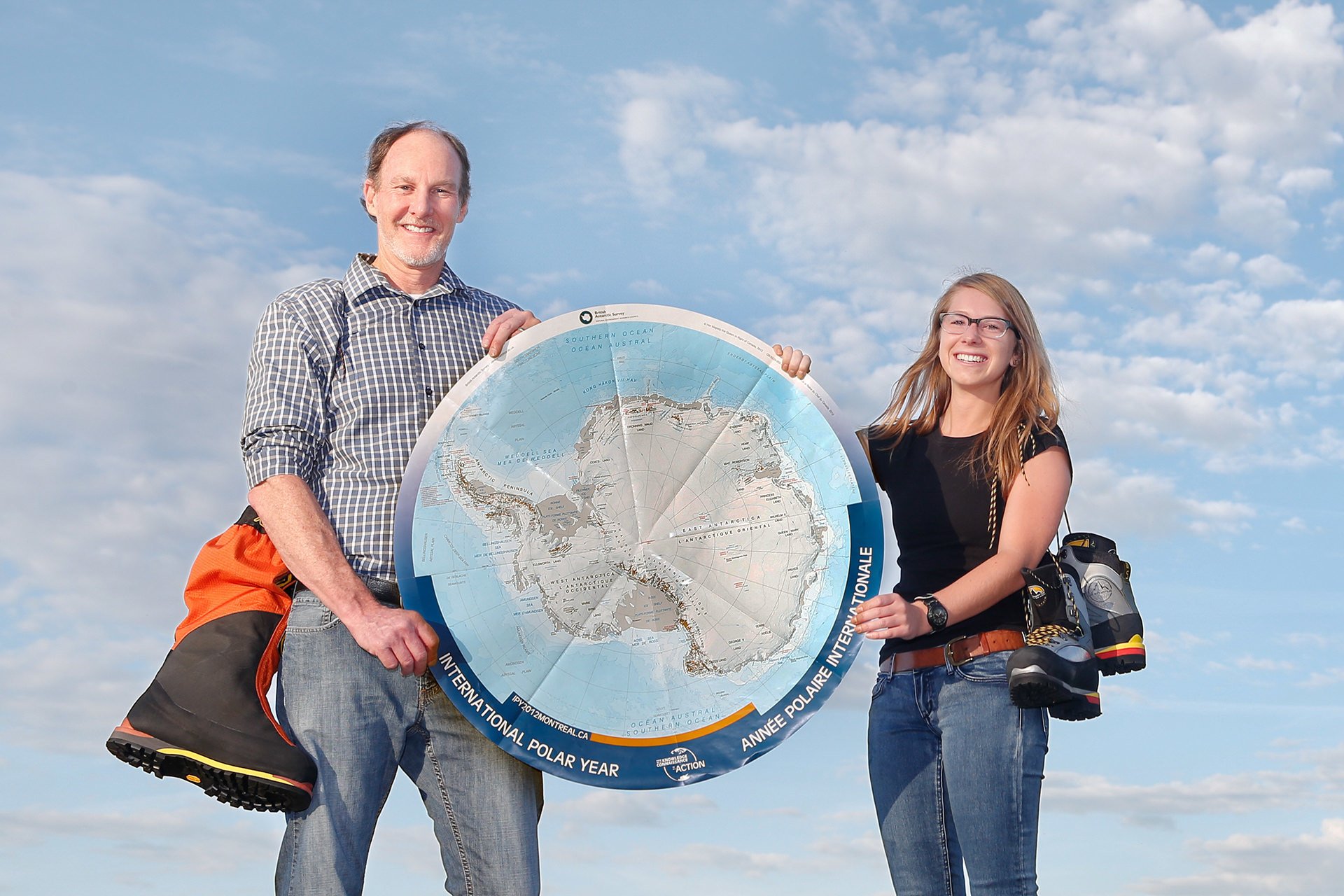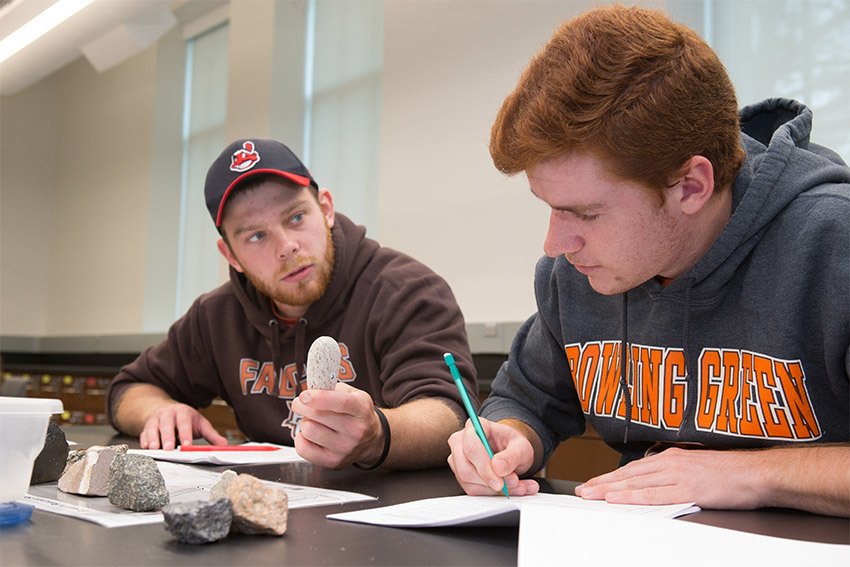#1 public university in Ohio for student experience
The Wall Street Journal

Bachelor of Science (B.S.)/Bachelor of Arts (B.A.)
Minor
Geology
Geology is about exploring Earth’s past and shaping its future. Earth’s story is written in layers of rocks, ancient fossils and shifting landscapes. A geology degree from Bowling Green State University gives you the tools to read that story – and apply the knowledge it reveals to help confront some of our most pressing environmental challenges.
The School of Earth, Environment and Society at BGSU offers a number of geology degree tracks:
- B.A. in geology – A flexible, interdisciplinary option ideal for students interested in applying a broad understanding of geology in diverse fields such as political science, public health, education or environmental law
- B.S. in geology – A more technical, research-driven track with an optional specialization in paleobiology for students passionate about fossils and ancient ecosystems
- Geology minor – A career-boosting asset for students in many different majors, including environmental sciences/environmental studies, engineering, biology, business, political science and education
After earning your bachelor’s degree you can stay at BGSU for an advanced degree. Our master’s in geology opens the door to more leadership opportunities in geological research, education and industry.
Why study geology at BGSU in Ohio?
- Faculty expertise and mentorship. Our geology faculty is experienced, passionate and active in research. While their academic specializations are wide-ranging, all share a commitment to student success.
- Leadership in geology research. The BGSU geology degree program puts particular emphasis on laboratory and field research. Students are required to take a five-week summer field course in New Mexico and Colorado. Anchor link to section below
- We also periodically offer trips to the Appalachian Mountains, the Ozark Mountains, Mammoth Cave in Kentucky, and more. Our students have been chosen for groundbreaking global research opportunities, such as a two-month expedition to Antarctica to study underwater volcanoes and climate change.
- Cutting-edge laboratories. BGSU geology majors have access to innovative earth science lab facilities equipped with modern research tools and equipment to ensure you graduate ready for the work world.
- Career-oriented curriculum. Geology is a broad field. Maximize career opportunities by tailoring your studies to align with long-term goals. Faculty can offer guidance on selecting either the B.S. or B.A. track, opting into a specialization (paleobiology or hydrogeology) and which electives to choose.
- Many minor degree options. A “general science” minor is typically offered to geology majors in place of a conventional minor. But the School of Earth, Environment and Society offers minors in several specialized areas:
- Environmental studies
- Environmental science
- Sustainability
- Water resources
- Applied geospatial science
- Paleontology
- Strong industry ties. BGSU conferences, field trips and collaborations allow you to connect with working geologists at top government agencies, environmental firms, energy companies and premier research institutions.
- On-campus connections. Join the BGSU Geology Club for social and professional opportunities – group discussions, movie nights, field trips and an annual geology banquet. Engage with the BGSU Office of Campus Sustainability in its strategic plan efforts to reduce, reuse, conserve, and recycle – with the ultimate aim of carbon neutrality by 2040.
Our internship program has a long and successful history. Many of our students are hired full time by their intern employers.
#1 university in Ohio for career preparation
The Wall Street Journal
Career - what can you do with a geology degree?
A geology degree from BGSU offers a rock solid foundation for success – whether your work takes you out into the field analyzing rock formations, to a laboratory conducting fossil research or to boardrooms guiding key environmental decisions.
A B.S. in geology typically leads to careers in fieldwork, lab research and environmental problem-solving. A B.A. in geology may provide opportunities for double majoring or stacking of additional career-focused credentials. Faculty mentors can provide personalized assistance in helping geology degree majors decide which path is the right one for their professional goals.
Geologists are in high demand across industries amid the backdrop of increasingly urgent global challenges like climate change, water scarcity, rising natural disasters and soaring energy costs. Most geology degree jobs are in government, corporate consulting, nonprofit advocacy and academia.
Geologists work in:
- Oil and gas exploration
- Resource management and mining
- Environmental consulting
- Natural hazard mitigation
- Planetary exploration
The work geologists do is important in helping societies:
- Understand and prepare for hazards such as earthquakes, volcanoes, floods and landslides.
- Investigate the origin and evolution of life and landscapes on Earth, and how climate changes have shaped our planet and its lifeforms.
- Explore the chemistry and movement of ocean waters and their impacts on climate and weather.
- Protect and manage precious natural resources like water, minerals and energy sources more safely and responsibly.
Career paths
- Educator
- Environmental engineer
- Environmental field technician
- Environmental scientist
- Geologist
- Geological engineer
- Geophysicist or geoscientist
- Hydrogeologist
- Land surveyor
- Museum curator
- Paleobiologist
- Petroleum or planetary geologist
- Sustainability consultant
Quick Facts from the Bureau of Labor Statistics
Curriculum
Geology is the study of Earth, its materials, its structure and the processes that are acting upon them. Geologists have the responsibility of discovering natural resources, identifying natural hazards and supplying critical information to help solve problems and establish important policy on protecting/managing natural resources, the environment and public health, safety and welfare.
Exact curriculum requirements differ depending on whether you are working toward the B.S. or B.A. Both include a minimum of 122 credit hours – 40 of those at the 3000/4000 level.
Graduates with a geology degree are able to:
- Identify, describe and classify earth materials, formations and structures and interpret them in the context of geological processes.
- Analyze and report quantitative geologic data collected in the field and laboratory.
- Read, write, present and critically evaluate geologic reports, professional papers and maps.
- Synthesize information from a variety of disciplines to solve geologic problems.

Sample courses
- Earth Materials
- Earth Structures and Tectonics
- Field Geology
- Geospatial Science
- Life Through Time
- Quantitative Methods in Geology
- Remote Sensing
- Sedimentation and Stratigraphy
- Volcanology
#1 public university in the Midwest students would choose again
The Wall Street Journal
Field Course
The BGSU Field Course is a hands-on, summer-long learning experience that takes geology students beyond the classroom and into the heart of diverse geological landscapes.
This immersive program exposes geology students to a wide range of real-world geological settings and applications that integrate cutting-edge technology like digital field mapping and Geographic Information Systems (GIS) to enhance your understanding of Earth’s dynamic processes.
Master essential geology skills in the field
Work with sedimentary, metamorphic and igneous rocks, developing the ability to make systematic observations, record precise data and interpret geological formations with confidence.
Explore iconic geological regions such as the Basin and Range, the Colorado Plateau and the Rocky Mountain provinces with field exercises such as:
- Sedimentary section analysis – measuring and interpreting stratigraphic sequences
- Geologic mapping – constructing detailed geologic maps from field observations
- Structural analysis – examining folds, faults and other geological formations
- Slope stability and environmental assessments – evaluating geohazards and land stability
- Fossil exploration – Students specializing in paleobiology will analyze the fossil record at each location.
Prepare for careers in modern geology by gaining experience with tools like Brunton compasses, GPS receivers, GIS databases and more.
Facilities, laboratories and equipment
BGSU geology majors have the advantage of state-of-the art laboratories and facilities in five buildings across campus. The School of Earth, Environment and Society offers top-of-the-line tools for use in hands-on learning and research in geophysical analysis, field hydrology, surveying and more.
Specialized laboratories include:
- GeoInformatics Laboratory (GIL)
- G-ECO Remote Sensing Lab
- Paleontology laboratory
- Geochemistry laboratory
- High temperature and pressure mineral synthesis laboratory
- Sedimentary processes laboratory
- Sediment core lab
- Rock preparation facilities
The geology programs are part of the School of Earth, Environment and Society in the BGSU College of Arts and Sciences.
Accreditation
Bowling Green State University [BGSU] is accredited by the Higher Learning Commission. BGSU has been accredited by the Higher Learning Commission since 01/01/1916. The most recent reaffirmation of accreditation was received in 2022-2023, with our next reaffirmation of accreditation scheduled for 2032-2033. Questions should be directed to the Office of Institutional Effectiveness.
Request Information
Updated: 05/06/2025 09:50AM

